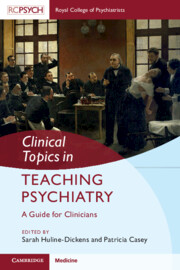Book contents
- Clinical Topics in Teaching Psychiatry
- Clinical Topics in Teaching Psychiatry
- Copyright page
- Dedication
- Contents
- Contributors
- A Note on the Cover
- Introduction
- Section 1 Teaching and Preparation
- Section 2 Teaching Methods
- Section 3 Feedback, Assessment and Supervision
- Section 4 Bridging the Gaps: Foundation Years and Interprofessional Education
- Section 5 Technologies Old and New
- Section 6 Supporting the Trainee in Difficulty
- Chapter 22 The Trainee in Difficulty: Where Are We Now?
- Chapter 23 Coaching and Mentoring: An Overview for Trainers in Psychiatry
- Index
- References
Chapter 22 - The Trainee in Difficulty: Where Are We Now?
from Section 6 - Supporting the Trainee in Difficulty
Published online by Cambridge University Press: 24 November 2022
- Clinical Topics in Teaching Psychiatry
- Clinical Topics in Teaching Psychiatry
- Copyright page
- Dedication
- Contents
- Contributors
- A Note on the Cover
- Introduction
- Section 1 Teaching and Preparation
- Section 2 Teaching Methods
- Section 3 Feedback, Assessment and Supervision
- Section 4 Bridging the Gaps: Foundation Years and Interprofessional Education
- Section 5 Technologies Old and New
- Section 6 Supporting the Trainee in Difficulty
- Chapter 22 The Trainee in Difficulty: Where Are We Now?
- Chapter 23 Coaching and Mentoring: An Overview for Trainers in Psychiatry
- Index
- References
Summary
In the guide written by Harden and Crosby (2000) for the Association for Medical Education in Europe (AMEE) called The Good Teacher Is More Than a Lecturer, the shift from traditional models of learning to a more learner-led one is emphasized and reflects the altered roles and expectations of teachers. Rather than dispensing information the teacher is seen more as a facilitator of learning and providing a supportive relationship for that learning to happen.
Supportive relationships are crucial to the success of training in busy clinical environments. Yet providing support and supportive relationships is still problematic in the health service. In 2019 alone, there were three published reports all highlighting problems and making suggestions for change; one from Health Education England (HEE); one from a National Institute of Health Research (NIHR) funded study undertaken by a team based at the University of Exeter Medical School; and one from the General Medical Council (GMC). It is worth looking at these briefly in turn.
- Type
- Chapter
- Information
- Clinical Topics in Teaching PsychiatryA Guide for Clinicians, pp. 261 - 273Publisher: Cambridge University PressPrint publication year: 2022

